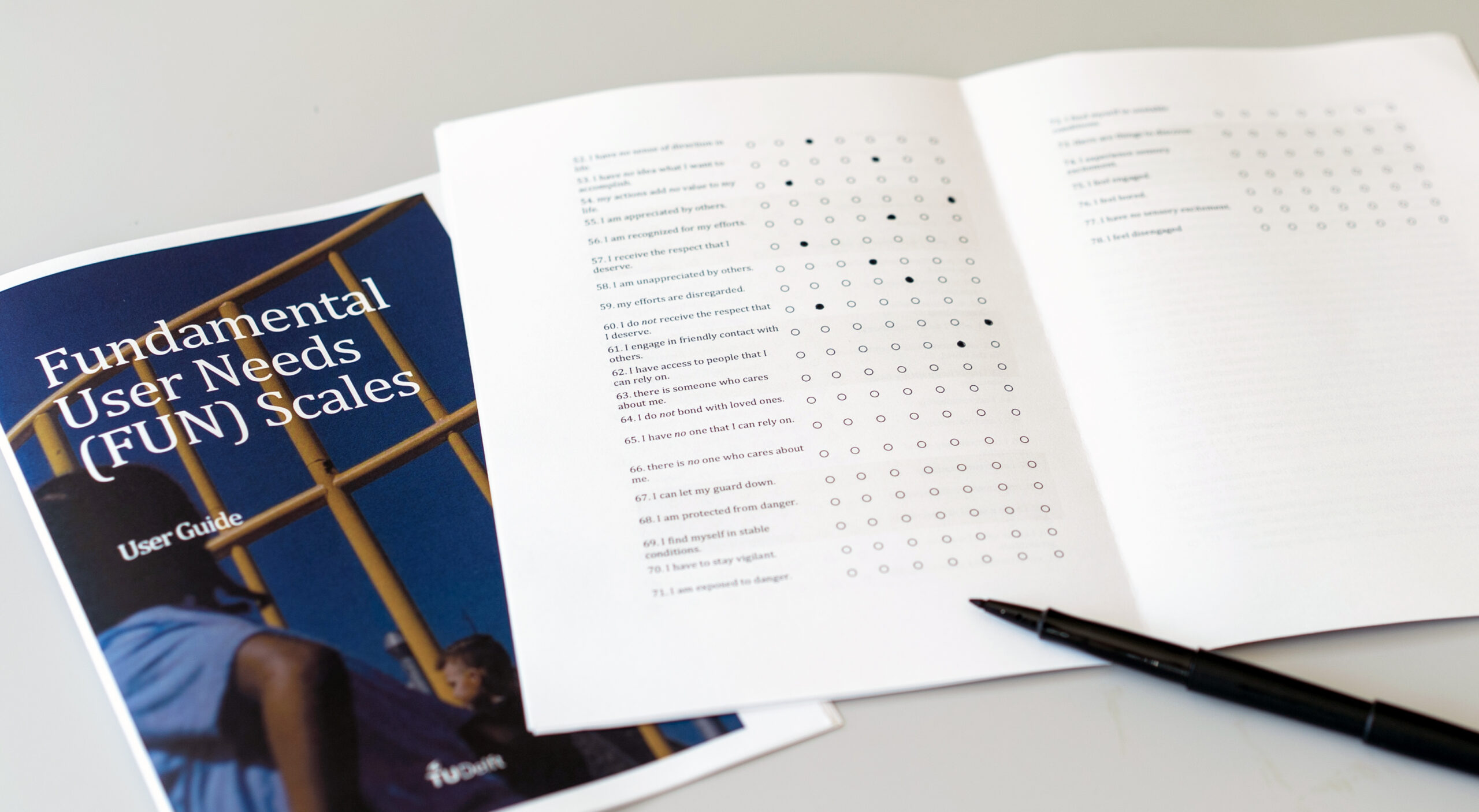“A shared language about user needs can provide a clear structure and guiding framework for human-centered design researchers and practitioners” (Huang, Desmet & Mugge, 2025, p. 11).
Understanding how design and technology impact our fundamental psychological needs is crucial for creating meaningful human-centered solutions. The Fundamental User Needs (FUN) Scales provide a tool for measuring both the satisfaction and frustration of these needs in design-mediated interactions.

Introduction
Design is ultimately about fulfilling human needs. Whether it’s a smartphone app, a piece of furniture, or a digital service, every human-made entity serves as an instrument for need satisfaction. The FUN Scales offer designers and researchers a way to assess the psychological impact of their creations through the lens of thirteen fundamental psychological needs.
The FUN Scales were developed to bridge the gap between theoretical research on basic psychological needs and practical design applications. They provide a standardized framework for evaluating how well design solutions support human flourishing and well-being.
Scale Structure
The FUN Scales measure need satisfaction and frustration across the thirteen fundamental psychological needs identified in the design-focused need typology (see Fundamental Needs Typology -> https://diopd.org/need-typology/).
The scales consist of a 39-item Need Satisfaction Scale and a 39-item Need Frustration Scale, with three items per need in each state. Both scales use a 7-point Likert scale ranging from “not true at all” to “completely true” with the stem “When using/interacting with…”
Scale Development and Validation
The FUN Scales were developed through a four-study validation process involving over 500 participants. Following a standardized scale development procedure, the research began with content validation by nine experts who assessed the relevance, clarity, and coverage of scale items. This was followed by two survey studies: the first used exploratory factor analysis with 252 participants to examine the scales’ factor structure and reliability; the second employed confirmatory factor analysis with 250 participants using a different product to validate the scale structure. The validation process demonstrated significant correlations with overall product satisfaction, confirming the scales’ criterion validity.
Key Features
- Comprehensive coverage: Unlike existing tools that focus on a limited set of needs, the FUN Scales assess thirteen fundamental psychological needs relevant to design.
- Dual assessment: The scales measure both need satisfaction (the positive fulfillment of needs) and need frustration (when needs are actively thwarted), providing a broad picture of need fulfillment.
- Design-focused: Specifically developed for assessing design-mediated interactions, making them directly applicable to human-centered design research and practice.
- Flexible application: Suitable for evaluating various design categories including physical products, digital interfaces, services, systems, and environments.
- Scoring options: Offers both detailed need-by-need analysis and overall satisfaction/frustration scores using percentage-converted metrics for easy interpretation and comparison.
Applications
The FUN Scales can be used throughout the design process, from the initial research phase to understand user needs and identify design opportunities, through concept development to evaluate and compare design concepts against need fulfillment criteria. During prototyping, the scales help test how well prototypes satisfy or frustrate fundamental needs, while in the evaluation phase, they assess the psychological impact of final designs. The scales can also be used for benchmarking, allowing teams to compare products or design iterations over time.
Practical Benefits
- Enhanced communication: Provides a shared language for discussing user needs across multidisciplinary teams and with stakeholders from different backgrounds.
- Evidence-based design: Enables designers to make informed decisions based on empirical evidence of psychological need fulfillment, going beyond usability and functionality to assess the psychological impact of design.
- Innovation opportunities: Identifies unmet needs and need conflicts, and uncovers areas for design improvement while keeping human needs at the center of the design process.
Availability and Getting Started
The FUN Scales are available for research and educational purposes and are designed to be accessible and straightforward to implement in research and practice. For detailed guidance on administration, scoring, and interpretation of results, please refer to the User Guide that accompanies the scales.
[Download User Guide -> https://zenodo.org/records/14907022] – Complete manual with all scale items and scoring procedures
Citation
Huang, S., Desmet, P.M.A., & Mugge, R. (2025). Introducing the Fundamental User Needs (FUN) Scales: Assessing Need Satisfaction and Frustration in Design-Mediated Interactions. International Journal of Human–Computer Interaction. DOI: 10.1080/10447318.2025.2450415
Authors
The FUN Scales were developed by researchers from the Delft Institute of Positive Design at Delft University of Technology: Siyuan Huang, Pieter Desmet, and Ruth Mugge.
Publication Date
First version was published in January 2025.
Contact
For questions about the FUN Scales or collaboration opportunities, please contact: siyuan.huang@utwente.nl.



